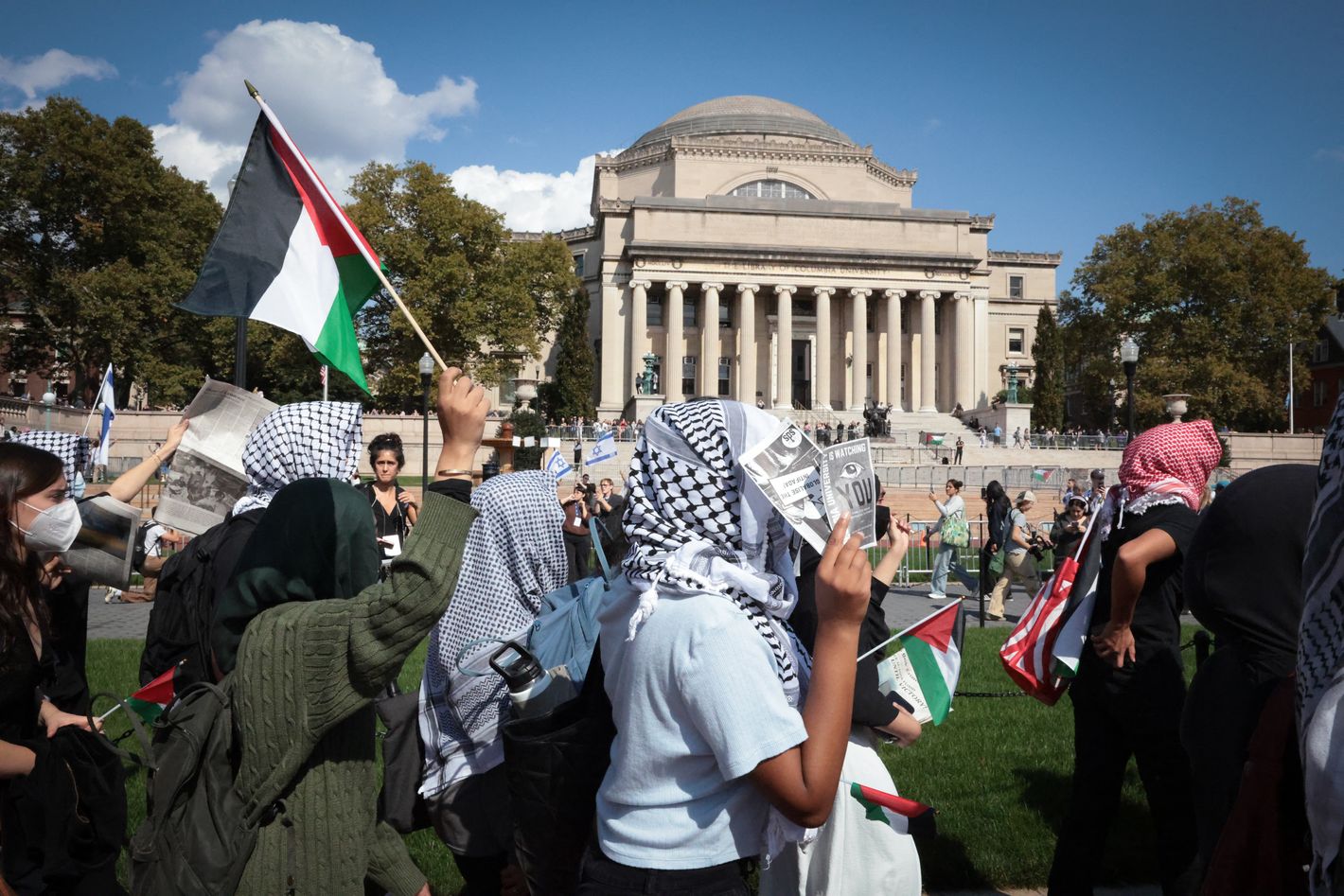Photo: Kena Betancu/AFP/Getty Images
If the capitulation of Columbia University to President Donald Trump was, in retrospect, inevitable, it was still among the darker moments in the modern history of academia. A prestigious, powerful institution that was, theoretically, dedicated to the concept of academic freedom had decided, in a matter of days, it was better to do what Trump says than fight back. In exchange for keeping $400 million in federal funds, Columbia agreed to hire three dozen campus police officers who will have the power to arrest students. They will appoint a senior vice-provost with authority over the department of Middle East, South Asian and African Studies and the Center for Palestine Studies, and require students wearing face coverings during protests to present university identification when asked.
All of these actions — especially the hiring of a new provost — will chill speech at Columbia and inevitably impact other institutions, since the Trump administration is currently abusing civil rights law to investigate 60 colleges for alleged antisemitism. Any kind of nonviolent protest or opinion expressed that is contrary to the U.S. government’s position on Israel’s war in Gaza could lead to federal harassment. And green-card holders, as we now know, are no longer safe. The Trump administration, with limited resistance from Columbia, is attempting to deport Mahmoud Khalil, a protest leader and former student. These are McCarthyite tactics.
Why did Columbia fold? An Ivy League colossus famed worldwide, Columbia boasts an endowment of almost $15 billion and countless well-heeled alumni. Much of the endowment cash has strings attached, but strings, for a university, can always be played with — if $400 million is an enormous sum, it’s still the sort that can be partially made up elsewhere through pieces of the endowment or future fundraisers. Certainly, the many successful and liberal graduates of Columbia would be happy to cut checks to a university that stands up to Trump.
The grimmer reality is that Columbia administrators and trustees probably wanted this. Some are simply Israel hawks who loathed the protests against the war in Gaza. None were actually violent or even reached the peaks of the 1968 anti-war occupations, but they offered optics that the elites of Columbia did not particularly like. Jewish students did complain, and if protests critical of a foreign nation-state are not, by definition, antisemitic — I am an American Jew, and Israel does not speak for me — there are always stray radicals in any large movement who spout ugly words. They deserve censure.
What Trump has done goes far beyond that and will likely suppress debate and research around one of the more vital topics on earth. Can a Columbia professor, as an academic exercise, even teach the concept of anti-Zionism or the displacement of Palestinians in the 1948 Palestine War? Can a student feel safe to pen an anti-Netanyahu op-ed for the campus newspaper? Or peacefully hold a sign at a campus rally? Columbia’s administrators have made it clear they will not support their students and faculty if the hammer of the federal government comes crashing down upon them. In fact, they’ll gladly pick it up and start swinging it themselves.
What American colleges and universities need now are wartime leaders. We do not actually live in a fascist state. Trump is not sending federal troops to colleges to lock up noncompliant administrators, and he’s not jailing any faculty. He is trying to abuse immigration law to torment the most vulnerable among us — non-citizens who reside here legally. But colleges are led by American citizens. They have a duty to use their privilege to stand up to Trump. A good example of what this spirit might look like is across the northern border, where Doug Ford, the Ontario premier, has become a national hero for resisting Trump. Canada is in a vulnerable position, but Ford doesn’t care. He was elected to fight for his province and he’s doing just that — and other Canadian leaders have gotten the message.
It might sound trite, but it’s usually true: Bullies aren’t used to getting hit and will back down when challenged. Columbia’s interim president, Katrina Armstrong, obviously has no appetite for a public-relations war against Trump. But other college presidents must understand that Trump is going to keep crushing them if they don’t recover whatever spine they have left and begin battling for academic freedom. Many of them are obsequious bureaucrats who aren’t used to such pursuits, but that is the reality now in front of them. If they don’t resist — daring Trump to revoke the federal funds, and heading to the public and their alumni networks to try to raise the cash to fill the budget holes — they will, like Columbia, have done deep and possibly irreparable damage to their brands. Columbia is wagering that people will soon forget about all of this; it’s an Ivy League and students will always covet an elite institution in an elite city. That’s probably true. But it’s also true that the richest and highest achieving do have options. Alumni can close their checkbooks or dissuade their children from going to a school that gave in so quickly to an incendiary, unpopular president.
These next months will be telling. Either American colleges and universities believe in their mission or they don’t. Either they fight for academic freedom, a concept that is as central to the functioning of an educational institution as water is to the human body, or they don’t — and the slow rot in our higher-education system accelerates. Trump can only subdue colleges if they let him do it. He is not an emperor; he is not even Xi or Putin. He is a culture warrior who sniffs weakness. So far, he’s been right. Academic administrators have been capitulators and collaborators. Maybe, though, not all of them are. There might be a few principled leaders left. Let’s see if they emerge.

